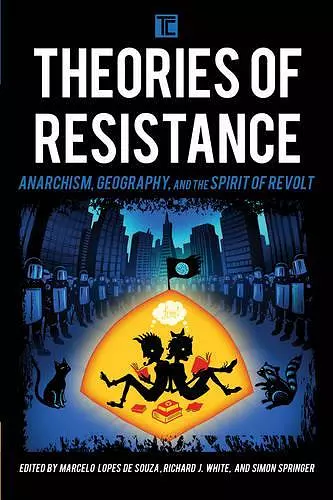Theories of Resistance
Anarchism, Geography, and the Spirit of Revolt
Simon Springer editor Richard J White editor Marcelo Lopes de Souza editor
Format:Hardback
Publisher:Bloomsbury Publishing PLC
Published:23rd Jun '16
Currently unavailable, and unfortunately no date known when it will be back
This hardback is available in another edition too:
- Paperback£49.99(9781783486670)

Space is never a neutral ‘stage’ on which social actors play their roles, sometimes cooperating with each other, sometimes struggling against each other. Space has multiple and complex functions in the development of social relations, it is a reference for identity-building, a material condition for existence, and an instrument of power.
This book explores the ways in which space has been used for resistance, especially in left-libertarian contexts. From the early anarchist organizing efforts in the 19th century to the contemporary social movements of the Mexican Zapatistas, the chapters examine a range of cases to illustrate both the limits and potentialities of utilizing space within anarchist practice. By theorizing the production of anarchist spaces, the book aims to foster new geographical imaginations that energetically cultivate alternative practices to challenge the status quo. It shows that spatial re-organization, spatial practices and spatial resources are also a basic condition for human emancipation, autonomy and freedom.
Theories of Resistance offers a refreshing collection of essays that reinvigorates anarchist theory in geography with utility for a range of scholars far beyond those who might label themselves ‘anarchists’. . . . [T]his volume showed me that anarchist thought can be applied to practices that are not explicitly anarchist, and provided theoretical frameworks for doing so. . . .Theories of Resistance illustrates that anarchism is still applicable and relevant: it can help develop a rich understanding of governance practices, aid in decolonization efforts, explicate the implications of different spatial strategies, and provide a framework for a deconstructive analyses of the state. Crucially, it can be applied to non-anarchist practices without appropriating them as anarchist. Like other theoretical traditions, anarchism is dynamic, multiple, and malleable, and this volume’s editors and contributors successfully demonstrate its pertinence by honoring anarchism’s historical legacy without being constrained by it. I hope their work encourages a diversity of geographers to engage more deeply with anarchism, as they have inspired me to do. * Antipode: A Radical Journal of Geography *
Capitalist globalisation, the redeployment of imperialism, the amplification of the environmental question and the regional rise of religious or ideological fundamentalism put geographical space at the centre of critical efforts… it logically comes to a new generation of geographers from different countries to resume the discussion from a spatial perspective. Based on libertarian thought already developed in this field... in an up-to-date manner they provide the reflexive tools to resist the dominant territories of capitalism and statism. -- Philippe Pelletier, University of Lyon 2
Theories of Resistance joins an insurrection of contemporary anarchist thought committed to interrogating so-called classical anarchism, and imagining new possibilities for left-libertarian ideas and practices in the present. This anthology poses essential questions for radical scholars and activists: How do we decolonize the world, while also decolonizing anarchism? What are the boundaries of left-libertarian thought? In what ways do anarchist geographies and communisation theory overlap? What does it mean to be anti-statist, and what is a post-statist epistemology? These are questions radicals grapple with in the streets and the libraries. -- Michael Truscello, Associate Professor, Mount Royal University
This volume – like the trilogy as a whole – is bound to intrigue, delight and challenge anyone interested in the manifold intersections between anti-authoritarian thinking and geographical inquiry broadly construed. The texts collected here are a testimony to the richness of this seam, and an invitation to reflect on some of the most pressing intellectual and social questions of our time. If you are looking for the freshest and most insightful writing on space and subversion, place and prefiguration, locality and liberation – then this book is for you. -- Uri Gordon, Teaching Fellow in Political Theory, Durham University, UK
The trilogy Anarchism, Geography, and the Spirit of Revolt … is an excellent compilation of cutting-edge inspirations for anarchism coming out of mainly geographical thought. … The chapters are of major importance for current anarchist studies in general. … Theories of Resistance is one of the titles in the trilogy. … The book provides viewpoints on many different aspects revolving around important theoretical challenges in current debates. … I would like to think of the edited book as a collection of feral theorizing: it is an expansion of anarchist thought into many important theoretical zones of scientific interest that have lain idle for far too long. In that sense Theories of Resistance is an important contribution not only for geographers but for anyone who wants to use words, concepts and theories as an empowering means to resist social injustices. * Anarchist Studies *
ISBN: 9781783486663
Dimensions: 238mm x 157mm x 26mm
Weight: 572g
270 pages